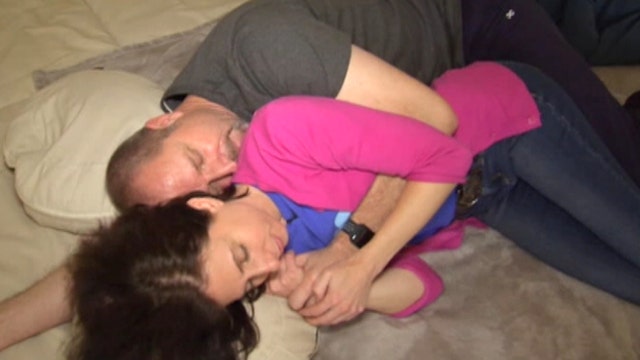Cuddle Sanctuary harnesses healing power of human touch
California clinic offers clients one-on-one sessions with a 'professional cuddler'
What happens when you cuddle with a stranger?
Nordic Cuddle, a cuddle therapy clinic in London, claims these sessions filled with soothing touches and hugs have many health benefits.
Those benefits could mean a boost of confidence, lessened stress and a deeper feeling of connection to the world.
WOMAN'S CHEST PAINS DIAGNOSED AS SPIRALING 'SPIRALING ESOPHAGUS'
Rebekka Mikkola is the lead practitioner and co-founder of the company. Her Nordic Cuddle profile states that she has over 1,000 hours of cuddling session practice.
In addition, Mikkola is a sought-after speaker on the topic who has done high-profile interviews with publications like The Guardian and Bustle, and also her own TEDx talk.
Each session starts with a consultation so the cuddle therapist can get to know a client’s background, Mikkola told The Guardian. She explained that clients know what cuddling position is coming up next, and they’re asked to give their consent before moving forward.
Rhik Samadder, a reporter for The Guardian, said he and Mikkola started out with a standing hug before trying other hugging positions on a bed. One of those included a full-on squeeze and others involved gentle massaging.
David Levesley, who wrote a GQ Magazine take on this Nordic Cuddle session, seemed to have a similar experience.
Mikkola apparently has an orderly process for her cuddles. Levesley noted that Mikkola keeps a professional boundary, despite her close quarters with clients.
Both writers concluded that cuddle therapy was both relaxing and powerful, yet sometimes uncomfortable.
Studies suggest that touch and quality social interaction play an important role in how people react to others and their surroundings.
One situation in the mid-1960s underscored this need with children in Romania, where many youngsters were spending a great deal of time in daycare-type settings, according to a report by The New Yorker.
NEW PROCEDURE THAT POSTPONES MENOPAUSE COULD ALSO LEAD TO LONGER FERTILITY
Caregivers were responsible for many children, and experts later noticed that these children who had less individual attention had subpar cognitive and social abilities. These expert observations were confirmed when the children were compared to other children from settings with a much lower caregiver-to-child ratio.
The findings indicated that the children received less attention when they were cared for in large groups. This led to many different reactions to peers and approach to academics than those with a smaller caregiver ratio.
Does that mean that cuddle therapy works for those who lack human interaction and touch? The service won’t be for everyone, suggests Samadder in The Guardian article.
And then there’s the dark side of cuddle and massage therapy in which some therapists have crossed boundaries.
For instance, a woman who took part in a recent cuddle session in Arizona claimed that her therapist took advantage of her, according to a USA Today report. The therapist’s certification was absolved after authorities received word about the incident. But the therapist still practices massage due to nuances between the different services.
While many people are jumping into this self-care service and reporting improvements, some negative experiences may raise concerns about keeping clients safe when they do book a session.
For Mikkola, it’s about making her clients feel safe during the session, she told GQ Magazine.
That’s the name of the game with a therapy that involves this level of touch.
CLICK HERE TO GET THE FOX NEWS APP
Many studies have focused on observing touch with children or the effects of massage therapy, but there’s not much information about how cuddle therapy specifically affects a person, leaving the issue of whether or not it really works largely speculative.









































